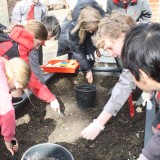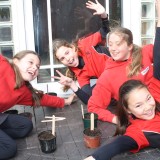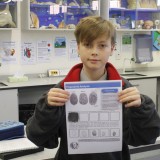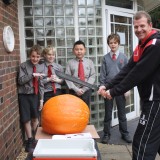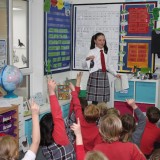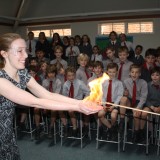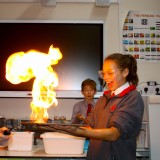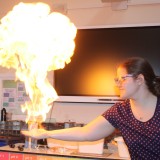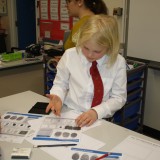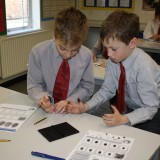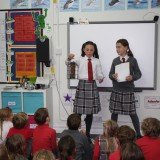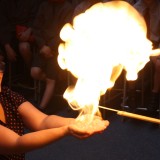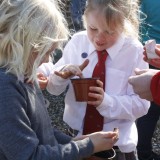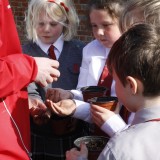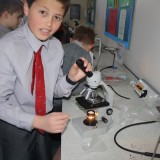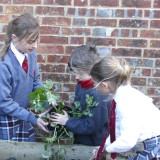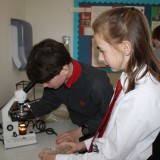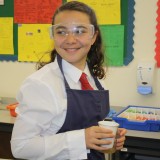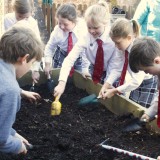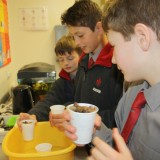The Science Department created a week of 'Whizz Bang’ to celebrate the 2019 British Science Week. The aim was to excite, thrill and engage all pupils in science, from 2 ½ to 13 years old.
British Science Week at Westbourne House was centred on practical applications of science in day-to-day life and set out to answer the question ‘Why is science useful?’. Alongside class-based activities, the science team created a plethora of experiments conducted at break and lunch times including dry ice, planting pollinating plants, fish dissections, and the show-stopping methane bubble experiment, which involved Caroline Thorne, Head of Science, holding bubbles which pupils safely set on fire!
Year 6 pupil, George Lin took part in every Science Week activity. He said, “I loved that there were a lot of fun things to do. My favourites were the dry ice experiments and setting Miss Thorne on fire! They were epic. I also liked cutting the pumpkin in half and planting the seeds. I really wish we could do Science Week again.”
At the conclusion of the week our Head of Science commented,
It was wonderful to get so many children enthusiastic about science in just one week. All the science staff enjoyed demonstrating the many varied ways science works with and supports nature, and impacts on our lives. For the younger children, who normally learn science as part of their topic, British Science Week was a fantastic opportunity to invite them to our laboratories, and to enthuse them about science with a range of experiments.
Caroline Thorne
The Science Department also saw British Science Week as an opportunity to showcase pupils’ passions. Lucy Pitman and Honor Pennant, Year 6, presented their passion - birds - to Year 2. The girls independently planned a 30 minute talk, which included a range of activities and a quiz. Year 2 pupils were engaged throughout and seemed to love listening to the older students talking so passionately.
The science team presented two assemblies with dry ice, giant bubbles and elephant toothpaste. The older children went on to have an inter-patrol (inter-house) elephant toothpaste competition to see who, or perhaps more precisely which quantities of the experiment ingredients, would create the most elephant toothpaste. The Panthers created an enormous quantity – more than enough for at least 10 elephants!
Seth Oglethorpe, who is in Year 6, summed it up saying, “Science Week was fabulous.”
Year group activities in detail:
In lesson time, pupils from Years 4 and 6 arrived at chemistry laboratory to discover a crime had taken place: the department’s chocolate cake had been stolen! Pupils had to find out who stole it by dusting for fingerprints left by staff and matching them up to the fingerprint database.
Year 7 pupils learnt about the dangers of plastic entering our oceans and looked at ways to prevent plastics getting into the waterways by making water filters. Some of these were highly successful and taught pupils which elements combine to make the best filters.
A number of the experiments focused on improving the habitat at the school to encourage pollination, which also ties in with an international pollination project that Westbourne House is involved in. Year 4 planted the broad beans they had been growing in class as well as filling the beds with other pollinating plants. Science teacher Mr Brown used a machete to cut open Mrs Edwards’s homegrown 25kg pumpkin and Years 5 and 6 planted the seeds. They also planted seeds to grow other vegetables including peppers, cucumbers, tomatoes and sweetcorn.
Tilly Morgan added, “I enjoyed planting the seeds to grow our own grub, it was fun. I loved it.”
Year 8 dissected a pluck, which is the lungs, heart and liver of an animal, which allowed them to observe how the lungs work, and the heart in relation to the lungs. They left the biology laboratory with a much greater appreciation of the complexities of organisms, as well as knowledge of how the tissues and organs are interrelated.
It was then the turn of our youngest children in our Nursery up to Year 3. They worked their way through the science block taking part in a range of experiments such as building electric circuits and towers, observing the differences in animal skulls, planting pollinating plants and studying stick insects and tadpoles.
Read more about Science Week in the Nursery.




